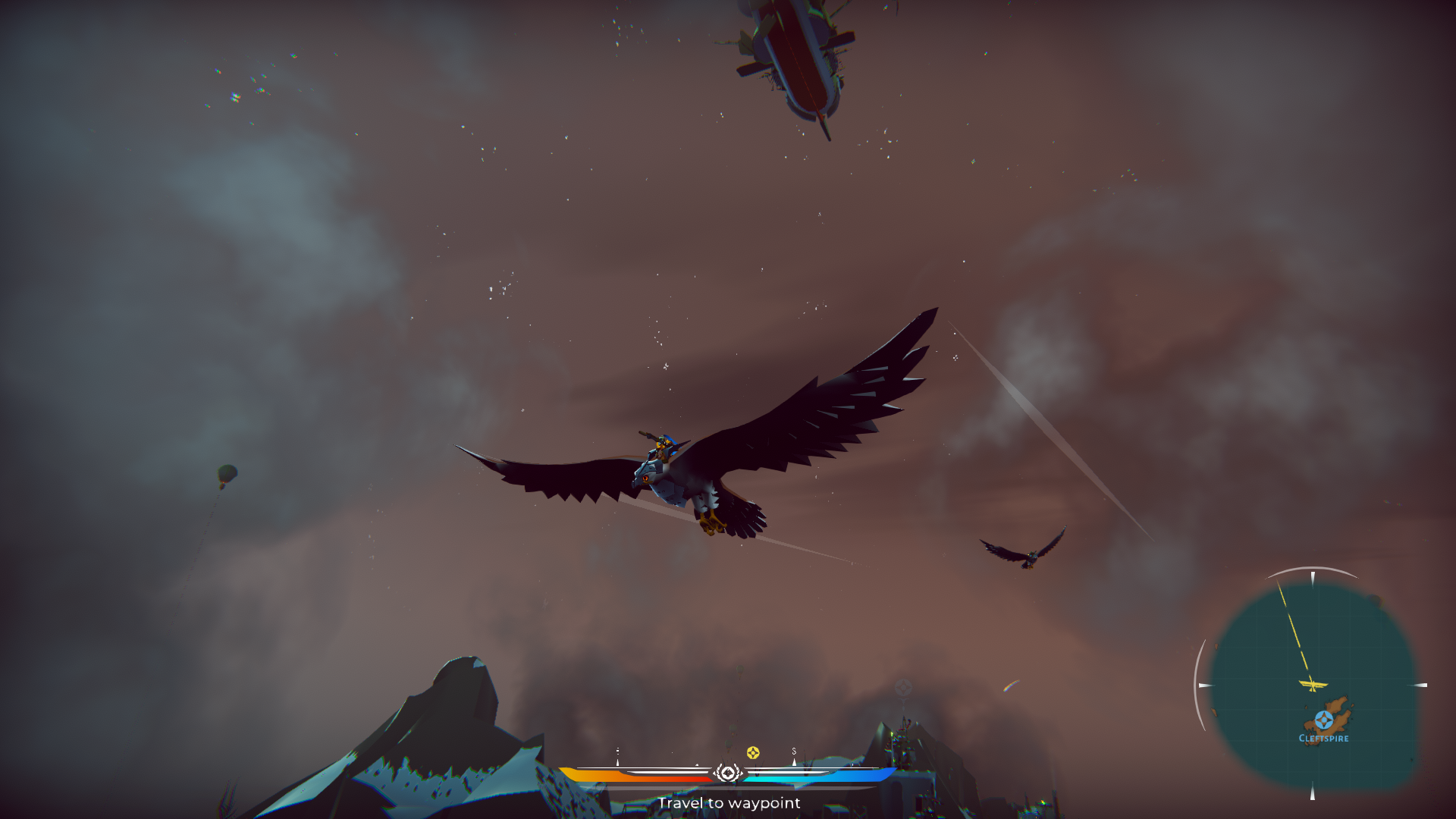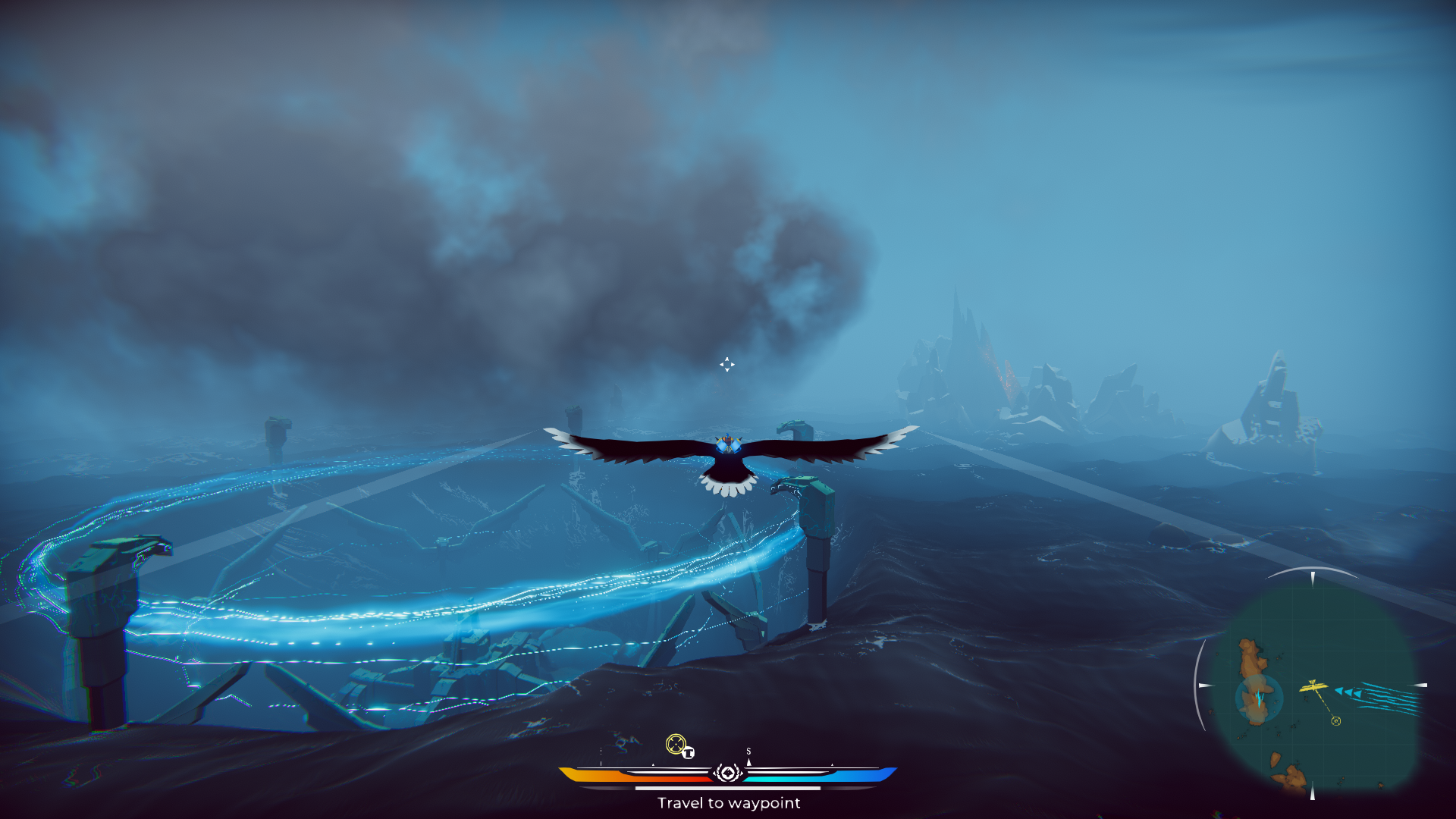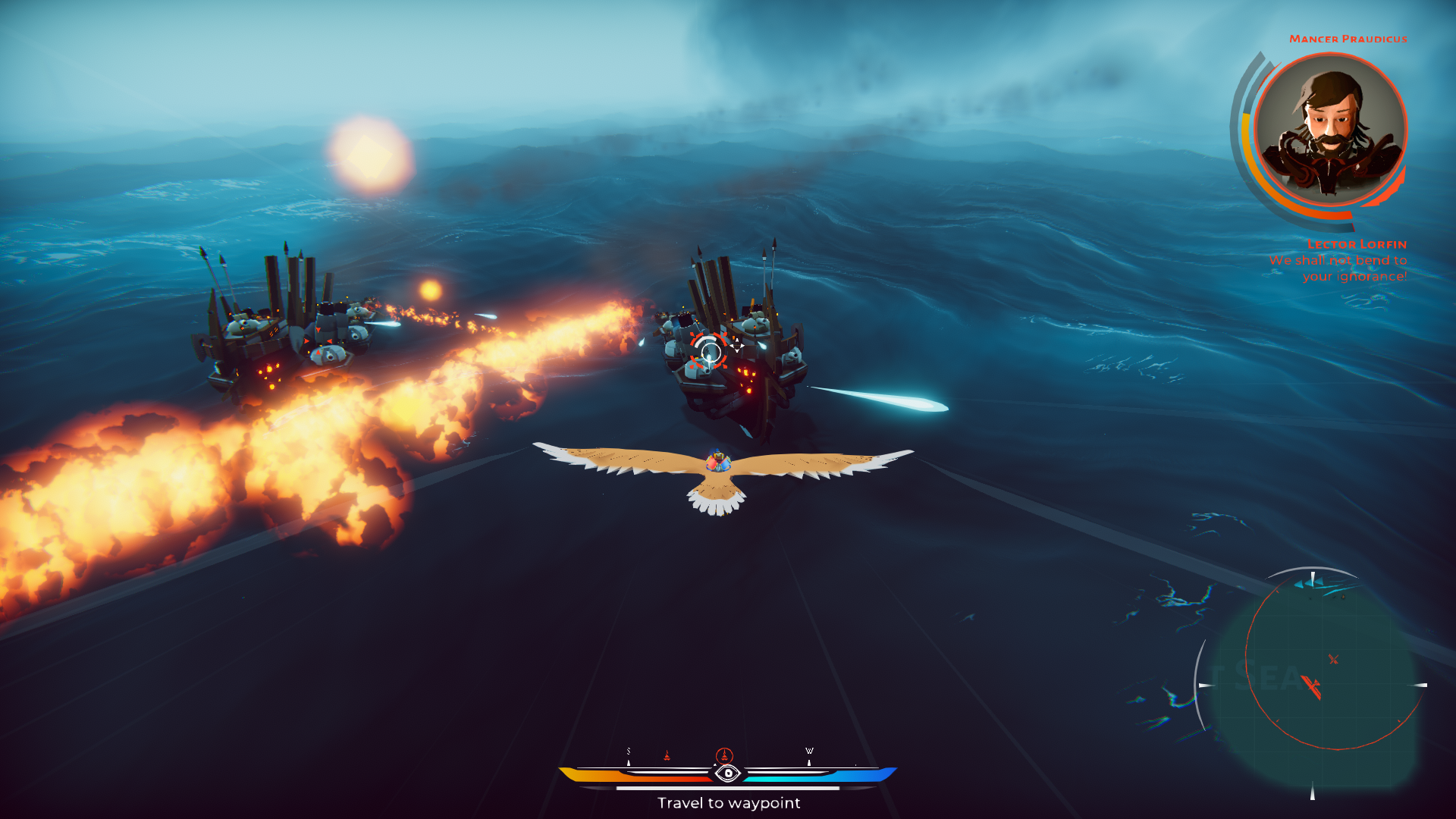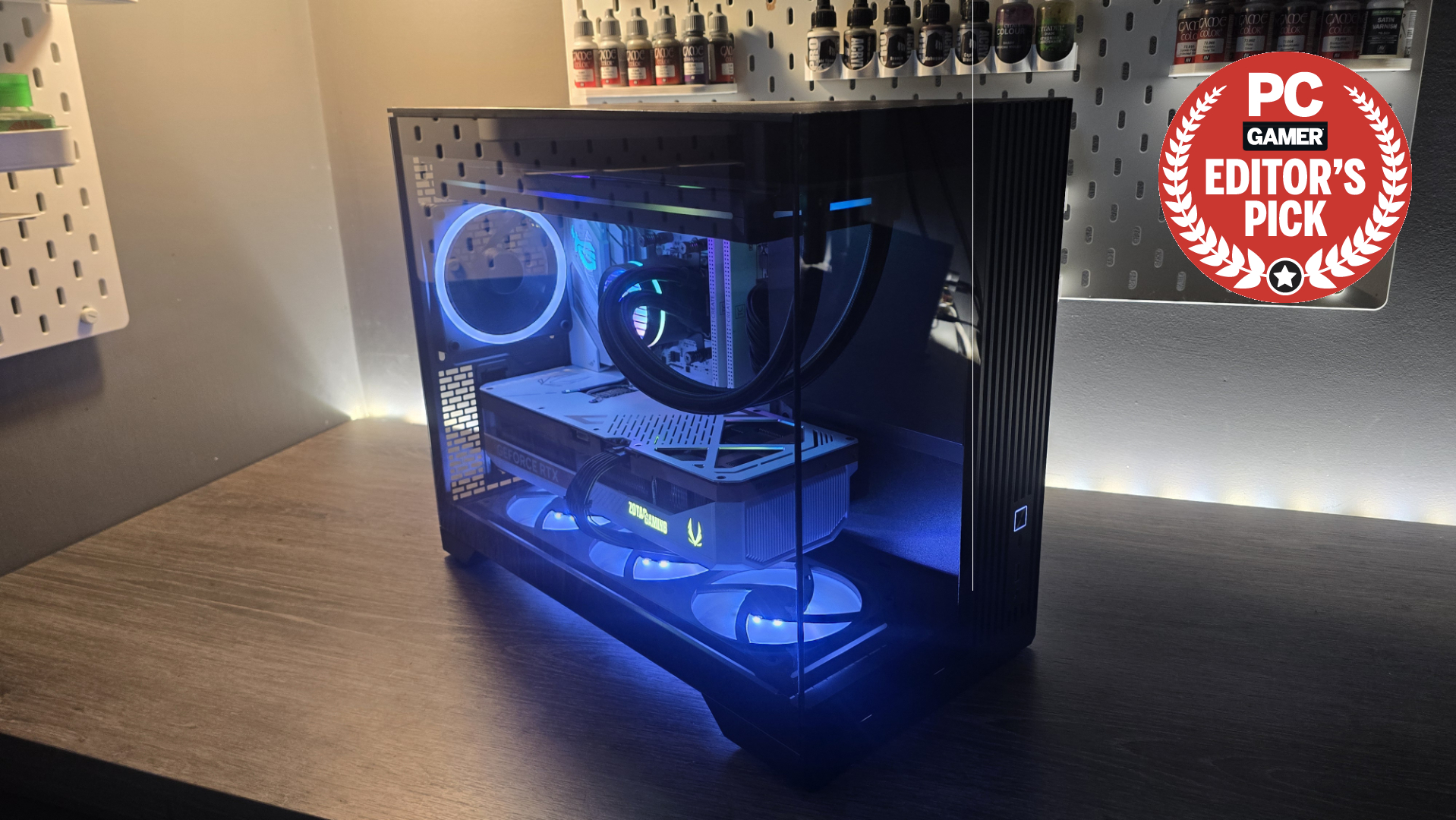Our Verdict
Despite a little turbulence, The Falconeer takes you on a memorable ride.
PC Gamer's got your back
What is it? A game that gives you a gun and a giant falcon (or a tiny person).
Expect to pay: $30/£25
Developer: Tomas Sala
Publisher: Wired Productions
Reviewed on: GeForce GTX 1650, AMD Ryzen 5 3550H, 8 GB RAM
Multiplayer: None
Link: Official site
Despite all the dialogue and narration, I walked away from The Falconeer with the most important question of all unanswered: Are they tiny people, or huge birds? I like riding on the back of a falcon as much as the next person, but give me a sense of perspective! This question didn’t bother me while I was gawping at the graphics and shooting down enemies, but it sat at the back of my mind throughout the adventure.
It’s a question that occurred to me because I care. The Falconeer's world, a huge expanse of water littered with islands controlled by warring factions, drew me in as the story progressed. I never felt a desire to skip the NPC chatter that precedes each mission.
As this is a world of water that Kevin Costner would feel at home in, dominance of sea and sky is vital, which is where you come in. As a falconeer, you’ll be riding your bird to help with anything from simple deliveries to assaults on heavily-guarded forts. Remarkably, The Falconeer is almost entirely the work of just one developer, Tomas Sala (with Benedict Nichols on audio duty), and he cites Crimson Skies as one of the main influences. It shows. The controls are a nigh-on perfect mix of casual bird sim and arcade aerial combat.
You’ll dive to increase speed and flap in place to reduce it, stretching your falcon’s wings out to gracefully turn when necessary. The accompanying squawks, flaps, and screeches work in tandem with the wonderful animation to create a convincing sense of being in control of a bird. Or, at least, a tiny or possibly normal-sized person on top of one.
Beak performance
The Falconeer's shooting would feel at home in a WWII dogfighting game—one gun, a familiar white circle trailing your target to allow for distance when aiming—and it also feels perfectly natural here. The Falconeer is a joy to control no matter what activity you’re doing (the three categories are attack, defence, and delivery), and not just because you’re rather amusingly given a barrel roll evasion move.
There are several escort missions, and these serve as excellent examples of how The Falconeer does most—but not all—things right. Now, I ordinarily hate escort missions. I’m only human. Yet accompanying a ship on its slow but steady journey doesn’t bother me in the slightest. Nothing going on for a while? Who cares? Have you seen those graphics? This is a gorgeous game, and I’ll ordinarily relish any opportunity to soak them up while enjoying the simple joy of flying my falcon. Once combat makes its inevitable appearance, it’s an enjoyable aerial dance between me and, usually, just a few enemies before we continue on our way.
However, there are no checkpoints, and this is a big issue for these missions. If I die partway through, I need to start all over again. On a third attempt, I find myself circling the ship in agitation, impatiently awaiting a fight that I know is coming while the ship merrily chugs along at what is now a frustratingly slow pace.
Keep up to date with the most important stories and the best deals, as picked by the PC Gamer team.
Nonetheless, this is a game that (usually) lovingly lays you down in a rich atmosphere with a successful mixture of soothingly chilled out traversal and tense combat. I love that I can be soaring through the clouds alone one minute and attacking a giant robot crab with hit and run tactics the next.
The Falconeer’s main issue—what prevents it from becoming the essential adventure I get occasional glimpses of—is its inconsistency. One small but noticeable issue is the cash awarded for completing story or side missions (needed for weapon and falcon upgrades), which often isn’t proportionate to the effort involved. An optional quest that takes just a few minutes might pay just as much as a lengthy story mission, which doesn’t make any sense. And while you’re given clear direction for story missions, you’re left to fend for yourself when it comes to exploring the open world outside of them, with nothing but the names of locations ever marked on your map (which, incidentally, you cannot place custom waypoints onto).
Wing, wing, hello?
Difficulty throughout the story is all over the place, with no smooth gradient. Significant difficulty spikes are rare, but very annoying when they hit, to the point where I eventually kicked the difficulty down to Easy to soften (but not negate) their effect. Also, having an ally for most story missions is a nice touch, and they’ll always pull their weight, but they won’t always follow instructions (limited to ‘hit this target’ or ‘get this enemy off my back’).
Despite these criticisms—and despite the absence of the option to automatically target a chasing enemy—The Falconeer still, mostly, shines. It says a lot that although optional missions are hollow instructions along the lines of ‘go here’ or ‘kill that’, I still eagerly dive into them for the extra cash. Any excuse to go back out into this intriguing world, I’ll take.
There’s always something to see. A whale, briefly visible as it leaps from the sea beneath you; a thunderstorm, which you might fly through to recharge your lightning gun; a temple you hadn’t yet discovered; somebody riding a dragon as big as your giant/normal sized falcon; a skyscape of sunset-kissed clouds. Most remarkably of all, even if it’s something you’ve seen a hundred times before, it still feels special.
The lack of direction outside of the story is as much a blessing as it is a curse, leaving long-term appeal up for debate. Even so, this is a flight you should take if you get the chance.
Despite a little turbulence, The Falconeer takes you on a memorable ride.





